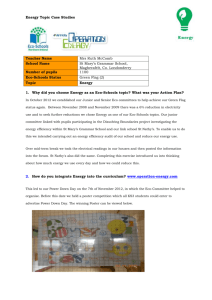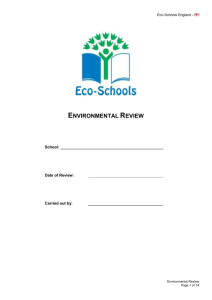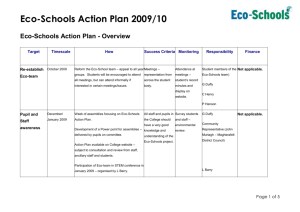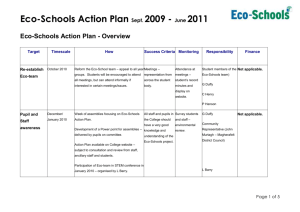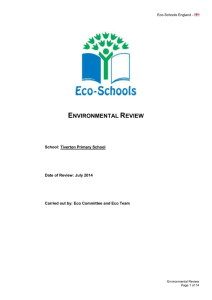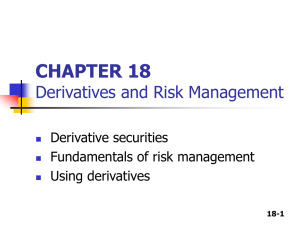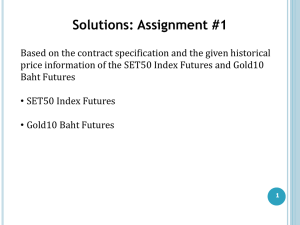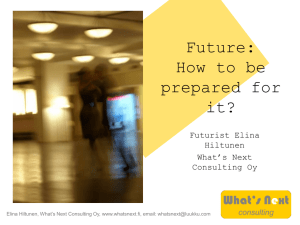Badock`s Wood Primary School Eco Schools Waste Questionnaire
advertisement
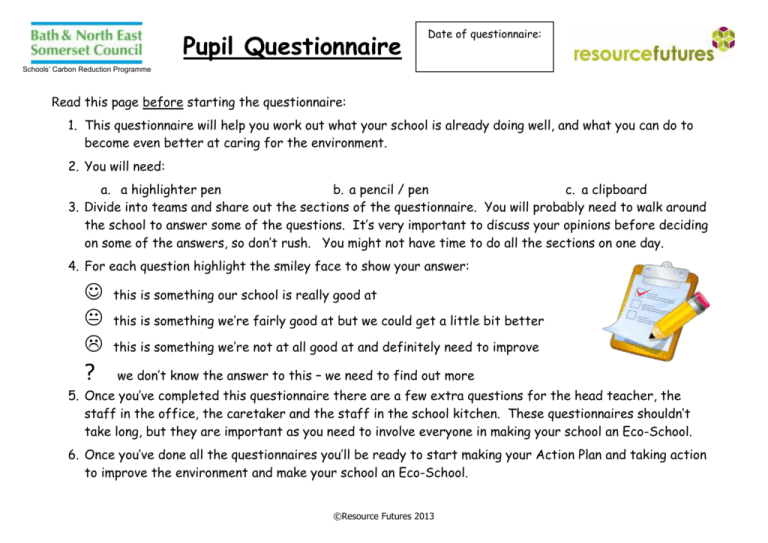
Pupil Questionnaire Date of questionnaire: Schools’ Carbon Reduction Programme Read this page before starting the questionnaire: 1. This questionnaire will help you work out what your school is already doing well, and what you can do to become even better at caring for the environment. 2. You will need: a. a highlighter pen b. a pencil / pen c. a clipboard 3. Divide into teams and share out the sections of the questionnaire. You will probably need to walk around the school to answer some of the questions. It’s very important to discuss your opinions before deciding on some of the answers, so don’t rush. You might not have time to do all the sections on one day. 4. For each question highlight the smiley face to show your answer: ? this is something our school is really good at this is something we’re fairly good at but we could get a little bit better this is something we’re not at all good at and definitely need to improve we don’t know the answer to this – we need to find out more 5. Once you’ve completed this questionnaire there are a few extra questions for the head teacher, the staff in the office, the caretaker and the staff in the school kitchen. These questionnaires shouldn’t take long, but they are important as you need to involve everyone in making your school an Eco-School. 6. Once you’ve done all the questionnaires you’ll be ready to start making your Action Plan and taking action to improve the environment and make your school an Eco-School. ©Resource Futures 2013 Eco-Schools topic: LITTER Section 1 Question Answer 1. Are there enough rubbish bins inside the school? ? 2. Are there enough rubbish bins outside in the playground and school grounds? ? 3. Do people use the rubbish bins properly? ? 4. Is there a school rule about litter that everybody understands? ? What could we to do to improve? Eco-Schools topic: WASTE Question Answer 1. Does every classroom have a scrap paper drawer so that pupils and teachers can reuse paper? ? 2. Does every room have a paper recycling container? ? 3. Is there contamination in the paper recycling containers (things that shouldn’t be there e.g., plastic, apple cores)? ? ©Resource Futures 2013 What could we to do to improve? 4. Has most of the paper in the recycling bins been used on both sides? *You might want to do an extra investigation to find out how much of your paper has been used on both sides. ? 5. Does paper that should be recycled ever get thrown in the rubbish bin? ? 6. Does the school have a compost bin for recycling fruit and vegetable waste? ? 7. Is somebody in the school responsible for adding other materials to your compost bin and keeping an eye on it? ? 8. Does the school encourage children to use re-fillable drink bottles? ? Does the school encourage children to have 9. packed lunches without throw-away packaging? Does the school have other types of 10. recycling collections? (E.g., cardboard, plastic bottle, ink cartridges) Does everyone understand WHY it is 11. important to recycle and reduce waste? * If the answer is ‘no’ you might need to plan a rubbish assembly! ? ? ? If you have any other ideas about waste or litter in your school make a note of them on the back. ©Resource Futures 2013 Eco-Schools topic: ENERGY Section 2 Question 1. Answer Are the windows and doors kept closed when it’s cold? ? 2. When the school heating is on, does it ever get too hot inside? 3. Are the lights always turned off in empty rooms? ? When it’s sunny, do teachers and children turn the lights off inside? ? Are computer monitors turned off when they are not being used during the day? ? Are interactive whiteboards turned off when they are not being used? ? ? * You could use a thermometer to check – classrooms should be between 18 and 20 °C. * You might want to do a bit of ‘spying’ to find out more! 4. 5. * You might want to do a bit of ‘spying’ to find out more! 6. * You might want to do a bit of ‘spying’ to find out more! 7. Are things that use electricity all turned off at the end of the school day? * If your Eco Committee meet after school you might want to do a bit of ‘spying’ to find out more! ? ©Resource Futures 2013 What could we to do to improve? Question 8. Answer Does everyone understand WHY it is important to use less energy? * If ‘no’, an assembly to remind everybody about climate change and saving energy might be a good idea. What could we to do to improve? ? Eco-Schools topic: WATER 1. Are there any dripping taps around the school? ? 2. Do taps sometimes get left on? ? 3. Is rainwater collected for watering plants? ? 4. If the school has a water meter, do pupils get involved with taking readings? ? 5. Does everyone understand WHY it is important not to waste water? ? If you have any other ideas about water or energy in your school make a note of them here or on the back of this sheet. ©Resource Futures 2013 Section 3 Eco-Schools topic: HEALTHY LIVING Question Answer 1. Do children have healthy snacks at school? ? 2. Can children drink water during the school day? ? 3. Does the school encourage healthy food in packed lunches? ? 4. Do children plant and grow their own food as part of their lessons? ? 5. Does the school have a gardening club? ? 6. Are there plants growing in pots in any classrooms? ? 7. Do children get plenty of exercise at playtime and during PE lessons? ? ©Resource Futures 2013 What could we to do to improve? Question 8. Answer Is it easy to open the classroom windows for fresh air? What could we to do to improve? ? Eco-Schools topics: SCHOOL GROUNDS and BIODIVERSITY 1. Are there plenty of things for climbing and balancing on in the playground? ? 2. Are there quiet, shady places to sit and talk to your friends? ? 3. In your school grounds do you have a variety of plants? ? bird boxes, baths or feeders? ? a pond? ? a log pile for minibeasts? ? a wildlife / conservation area? ? ©Resource Futures 2013 4. If yes, are pupils involved in looking after them? ? 5. Do children sometimes have lessons outside? ? If you have any other ideas about healthy living, biodiversity or the school grounds make a note of them here. ©Resource Futures 2013 Section 4 Eco-Schools topic: TRANSPORT Question Answer 1. Does the school monitor how pupils travel to school? ? 2. Does the school organise ‘walk to school’ or ‘cycle to school’ events? ? 3. Is there somewhere safe to store bicycles and scooters for people who cycle to school? ? 4. Does the school offer training for children to learn how to cycle safely? ? 5. Does everyone understand WHY it is important to walk and cycle as much as possible? ? What could we to do to improve? Eco-Schools topic: GLOBAL CITIZENSHIP 1. Does your school have links with schools or communities in other countries? ? 2. Has your school got involved with projects (e.g., raising money) to help people, animals or the environment in other countries? ? ©Resource Futures 2013 GENERAL QUESTIONS Question Answer 1. Do the school corridors, hall and classrooms look good? ? 2. Is there any part of the school which could be made more pleasant? ? 3. Is there an Eco-Schools notice board for all the children and parents to see? ? 4. Is there information about your EcoSchools work in the school newsletters? ? 5. 6. 7. Do you have regular assemblies to remind everyone about Eco-Schools and caring for the environment? Do you have visitors to the school to help you learn about caring for the environment? Do children go on visits to learn more about the environment? ? ? ? ©Resource Futures 2013 What could we to do to improve? Well done! After answering all those questions, and the ones for the head teacher, the office staff, the caretaker and the kitchen staff, you should be ready to make an Action Plan. Remember to be realistic – you won’t be able to change everything at once. For now, choose 3 things that are quick and easy to do, and one that is going to take a bit longer and more work. If members of the Eco Committee have different opinions you might need to vote to decide. Quick and easy things: 1. 2. 3. Something that will take longer and more work: Next you will need to talk about how you’re going to make these things happen. You’ll need to decide who is going to do what jobs, when they are going to do them, and how you are going to check that your plans are working. Remember to write down what you decide – this is called an Action Plan. Make sure everyone in the school knows about the Action Plan. You could display it on your Eco-Schools noticeboard, tell everyone about it in an assembly, and put it on your school website. And then the most important and enjoyable bit – TAKE ACTION and make your school an Eco-School! ©Resource Futures 2013
